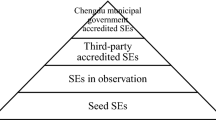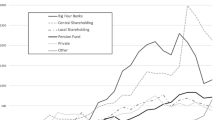Abstract
“Small treasuries” (xiaojinku) are off-book accounts found in many large enterprises in China for the purpose of rewarding managers and their subordinates, building up guanxi (personal networks), and even financing the business operations of their danwei (work units). We analyze CESTs with reference to their antecedents, constructs, and consequences. Our analysis indicates that while CESTs can, in some cases, help organizations deal with immediate financial problems, they have negative impacts on organizational performance in relation to the moral hazard of managers, as well as the allocation of organizational resources, in respect of sustainability of strategic advantages and growth, and mismanagement of organizations. Because of the involutionary behavior of managers in Chinese enterprises, we propose that it will require not only organizational controls, but also a fundamental change in these managers’ ideology for solving the problems of CESTs.
Similar content being viewed by others
References
Anand V., Ashforth B. E., Joshi M. (2004) Business as Usual: The Acceptance and Perpetuation of Corruption in Organizations. Academy of Management Executive 18(2):39–53
Andvig J. (1995) Corruption in the North Sea Oil Industry. Crime, Law and Social Change 23:289–313
Bales R. F. (1958) Task Roles and Social Roles in Problem-solving Groups. in Maccoby E. E., Newcomb T. M., Hartley E. L. (eds) Readings in Social Psychology. New York, Holt, Rinehart and Winston, pp. 437–459
Bansal P., Roth K. (2000) Why Companies Go Green: A Model of Ecological Responsiveness. Academy of Management Journal 43(4):717–747
Brass D. J., Butterfield K. D., Skaggs B. C. (1998) Relationships and Unethical Behavior: A Social Network Perspective. Academy of Management Review 23:14–31
Cable D. M., Judge T. A. (2003) Managers’ Upward Influence Tactic Strategies: The Role of Manager Personality and Supervisor Leadership Style. Journal of Organizational Behavior 24(2):197–205
Center for Democracy and Governance: 1999, USAID Handbook on Fighting Corruption (Center for Democracy and Governance, Washington)
China Daily: 2003, ‚Analysis: Empowering the Individual’, China Daily August 22, 2003, p.1
Crawford, L.: 2003, ‚BBVA Admits Secret Offshore Bank Account’ (London edition), Financial Times. London (UK): Jan 17:2003. p. 28
Deephouse D. L. (1996) Does Isomorphism Legitimate? Academy of Management Journal 39(4):1024–1039
Deng X. (1983) Selected Works of Deng Xiaoping. Beijing: Foreign Languages Press
DiMaggio P. J., Powell W. W. (1983) The Iron Cage Revisited: Institutional Isomorphism and Collective Rationality in Organizational Fields. American Sociological Review 48:147–160
Doig A., Theobald R. (2000) Corruption and Democratisation. Frank Cass: London
Fan, Y.: 2002, ‚Guanxi’s Consequences: Personal Gains at Social Cost’, Journal of Business Ethics 38(4) Part 2, 371–380
Fazhi Ribao, May 2, 1989, p. 2
Feldman R. P. (1984) Some Special Aspects of Suicide in Adolescence and Youth. in Linzer N. (ed) Suicide: The will to Live vs. the will to Die:101–112. New York, Human Services Press
Financial Times: 1999, Dec 17:1999, p. 07
Friedrich C. J. (1989) Corruption Concepts in Historical Perspective. in Heidenheimer A. J., Johnston M., LeVine V. T. (eds) Political Corruption: A Handbook. Transaction Publishers New Brunswick, New Jersey
Geertz C. 1970. Agricultural Involution: The Processes of Ecological Change in Indonesia. Cal., University of California Press
Gioia D. A. (2003) Business Organization as Instrument of Societal Responsibility. Organization 10(3):435–452
Girling J. (1997) Corruption, Capitalism and Democracy. Routledge: London
Gold T. B. (1991) Urban Private Business and China’s Reform. in Baum R. (ed) Reform and Reaction in Post-Mao China. New York, Routledge
Goldsmith A. A. (1999) Slapping the Grapping Hand: Correlates of Political Corruption in Emerging Markets. American Journal of Economics and Sociology 58(4):866–883
Gong T. (1997) Forms and Characteristics of China’s Corruption in the 1990s: Change with Continuity. Communist and Post-communist Studies 30(3):277–288
Gordon W. (1996) Corruption and Market Reform in China. IDS Bulletin 27(2):40–47
Greenberger D. B., Micelli M. P., Cohen D. J. (1987) Oppositions and Group Norms: The Reciprocal Influence of Whistle-blowing and Co-workers. Journal of Business Ethics 6:527–542
Hollensbe E. C., Guthrie J. P. (2000) Group Pay-for-performance Plans: The Role of Spontaneous Goal Setting. Academy of Management Review 25(4):864–872
Huang L. J., Snell R. S. (2003) Turnaround, Corruption and Mediocrity: Leadership and Governance in Three State Owned Enterprises in Mainland China. Journal of Business Ethics 43(1/2):111–127
Husted B. W. (1994) Honor Among Thieves: A Transaction-cost Interpretation of Corruption in Third World Countries. Business Ethics Quarterly IV:17–27
Inside China Mainland: 1999, ‚Stubborn “Little Treasuries” in Need of Rectification’, Inside China Mainland Aug 1, 1999, p. 1
Jensen M. C. (1986) Agency Costs of Free Cash Flow, Corporate Finance, and Takeovers. American Economic Review, 76:323–329
Johnston M., Hao Y. (1995) China Surge of Corruption. Journal of Democracy 6(4):80–94
Larrabee J. H. (1996) Emerging Model of Quality. IMAGE: Journal of Nursing Scholarship 28:353–358
Lindgreen A. (2004) Corruption and Unethical Behavior: Report on a Set of Danish Guidelines. Journal of Business Ethics 51(1):31–45
Lu X. (2000) Cadres and Corruption: The Organizational Involution of the Chinese Communist Party. CA, Stanford University Press
Manion M. (1996) Corruption by Design: Bribery in Chinese Enterprise Licensing. Journal of Law, Economics, and Organization 12(1):167–195
Manion M. (1998) Issues in Corruption Control in Post-Mao China. Issues and Studies 34(9):1–21
McArthur, J. and F. Teal: 2002, ‚Corruption and Firm Performance in Africa’, Working Paper, Centre for the Study of African Economies, Department of Economics, University of Oxford
Nye J. S. (1967) Corruption and Political Development. American Political Science Review 61(2):417–427
People’s Daily: 2003, October 17, 2003, p. 2
People’s Daily: 2004, March 22, 2004, p.12
Pye R. (1992) An Overview of Civil Service Computerisation, 1960–1990. Dublin: Economic and Social Research Inst
Sands B. N. (1989) Market-clearing by Corruption: Political Economy of China’s Recent Economic Reforms. Journal of Institutional and Theoretical Economics 145:122–152
Shleifer A., Vishny R. W. (1993) Corruption. Quarterly Journal of Economics 108(3):599–617
Steidlmeier P. (1999) Gift-giving, Bribery, and Corruption: Ethical Management of Business Relationships in China. Journal of Business Ethics 20(2):121–132
Su C., Littlefield J. E. (2001) Entering Guanxi: A Business Ethical Dilemma in Mainland China. Journal of Business Ethics 33(3/2):199–210
Suchman M. C. (1995) Managing Legitimacy: Strategic and Institutional Approaches. Academy of Management Review 20(3):571–610
Transparency international: 2004, Corruption Perceptions Index 2004, Transparency International
Treisman D. (2000) The Causes of Corruption: A Cross-national Study. Journal of Public Economics 76(3):399–457
Tullock G. (1996) Corruption Theory and Practice. Contemporary Economic Policy 14(3):6–13
Washington Post: 2003, Oct 31, 2003.p. E.01
Wedeman A. (2000) Budgets, Extra-budgets, and Small Treasuries: Illegal Monies and Local Autonomy in China. The China Journal 9(25):489–511
Wernerfelt B. (1984) A Resource-based View of the Firm. Strategic Management Journal 5:171–180
Yang M. M. (1994) Gifts, Favors, and Banquets: The Art of Social Relationships in China. Ithaca, NY, Cornell University Press
Zhao Z. (1987) Advance Along the Road to Socialism with Chinese Characteristics. Beijing Review 30:45–46
Author information
Authors and Affiliations
Corresponding author
Rights and permissions
About this article
Cite this article
Hung, H. Normalized Collective Corruption in a Transitional Economy: Small Treasuries in Large Chinese Enterprises. J Bus Ethics 79, 69–83 (2008). https://doi.org/10.1007/s10551-007-9396-2
Published:
Issue Date:
DOI: https://doi.org/10.1007/s10551-007-9396-2




